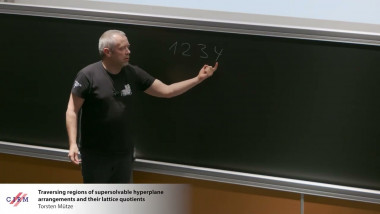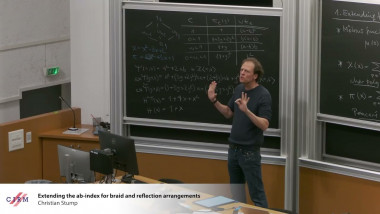
Traversing regions of supersolvable hyperplane arrangements and their lattice quotients
By Torsten Mütze

Extending the ab-index for braid and reflection arrangements
By Christian Stump
By Karol Penson
Appears in collection : Combinatorics and Arithmetic for Physics : Special Days
We report on further investigations of combinatorial sequences in form of integral ratios of factorials. We conceive these integers as Hausdorff power moments for weights W (x), concentrated on the support x ∈ (0, R), and we solve this mo- ment problem by furnishing the exact expressions for W (x)’s. In many instances we can formally prove that the sequences are positive definite. We considered a large set of families of such sequences including: formulas of Tutte et al. for enumerations of planar maps, several generalizations of Catalan numbers such as Fuss-Catalan and Raney numbers, the constellation numbers, and the ratios of multiple factorials, such as the iconic Kontsevich ($\frac{(6n)!n !}{(3n)![(2n)!]²}$ And Chebyshev ($\frac{(30n)!n !}{(6n)!(10n)!(15n) !}$ ) sequences. Furthermore, we provide the exact solutions for all three parametrized families of Bober ratios (2009) of factorials, as well as for the ”sporadic” ratios, for all of which the ordinary generating functions (ogf) are alge- braic. Finally, in the same spirit, we studied the sequences recently constructed by Rodriquez Villegas (2019-2022), including $\frac{(63n)!(8n)!(2n)!}{ n!(4n)!(16n)!(21n)!(31n)!}$ . In all the cases listed above we have identified a precisely defined and persistent pattern relating the Meijer G-encodings of appropriate ogf G(z) and of W (x). In fact, it appears that in the language of Meijer G-functions, the solutions W (x) are practically automatically obtained by reshuffling of data characterizing the ogf G(z) only, i.e. the parameter lists and its radius of convergence R^{−1}. We attempt to cate- gorize these observations and try to find the criteria for moments which would allow for such an automatisation. It is also intriguing that the counterexamples can be found, which clearly point to the limits of this procedure. Finding the pre- cise criteria for moments which would permit for such a speedy method, is still a challenging open problem. ⋆ Collaboration at various stages of this work with: N. Behr, G. H. E. Duchamp, K. Górska, M. Kontsevich, and G. Koshevoy.
